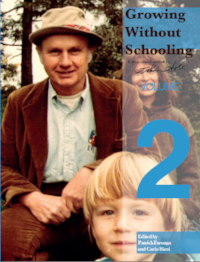Growing Without Schooling Volume 2
1981 to 1982
Taking Responsibility
GWS #22
John Holt: Parents preparing to submit to the schools a written home education plan for their children might find it useful to include a few words more or less like this:
In teaching our own children at home, we intend to take full responsibility for the results of our work. If any of our ways of teaching prove ineffective, we will not blame this on the children, in whatever way. Instead, using the flexibility of curriculum and methods that our small numbers will allow us, we will stop using any materials or methods of instruction that do not work, and instead will try other methods until we find some that work better. We understand that it might be very difficult to do this for large numbers of teachers and children, but it will be easy for us.
The second volume covers the fourth and fifth years of publication, as homeschooling was getting more attention in the media and the schools continued to be threatening and uncooperative towards many homeschoolers. Various social, educational, and legal strategies are discussed for dealing with the isolation and distress of some readers, but overall the rich and surprising moments of being with children as they learn and play shine throughout each issue.
• Purchase a print (534 pages, 8/5 x 11, $35) or Kindle edition ($8.99).
• Purchase a PDF edition ($8.99).
º GWS V. 2 in PDF is completely searchable. You can enter any search term and instantly find references to your query.
• Purchase an ebook edition ($8.99) from SmashWords, Apple's iTunes/iBook store, or Barnes and Noble.
No Ideal School
GWS #25
Every so often someone asks me what I think would be an ideal school. My answer is that for me there is no such thing as an “ideal” school. A school is not an ideal. It is a social response to a difficult and wrong situation—a society which has no room and no use for children, and which has few people who are glad or even willing to have them around.
The ideal would be a society in which knowledge was widely available and freely shared, and in which children were everywhere safe and welcome. Such a society would have many resources for the free exchange of knowledge and skills—materials and activity centers, something like our libraries but many more of them, and much larger and with many things in them besides books. And these centers (unlike Boston libraries these days) would be open every evening and weekend.
Of course, there is no such ideal society, in this country or any other, and we are a long way from seeing one. Meanwhile, in our community of homeschoolers, we must try to come as close to making such a society as we can.—JH
Work, Play, & “Social Life’’
GWS #29
Nancy Wallace (NY) wrote last year to the mother in “Isolated,” GWS # 20:
Until Ishmael was 2, we lived in a tiny log cabin in northern Vermont with virtually no neighbors. We were very isolated and we felt it. Ishmael particularly seemed to need something he wasn’t getting, and it was a trying time. The winters were so long and the summers so cold that he couldn’t get out much. By the time he was a year and a half, he’d explored the whole house, broken our chess set, lost most of my little “things” and really seemed to need companionship. For a month or so, we drove and drove to a play group which he seemed to like, but he didn’t play with the other little kids much—in fact, all the young ones seemed to be doing their own thing. What he especially liked was a workbench, complete with saw and vice, and just the opportunity to mess around with new stuff.
So we bought him a set of real tools, which delighted him, and started to take him to places we wanted to go to—Bob’s work, libraries, art exhibits, etc., and generally involved him more in adult life. I let him cook, clean, plant the garden and so on, and from then on things seemed to change. He enjoyed other children, but he didn’t need them, and by the age of two, he had become a very independent little person—sociable, yes, but also capable of spending long periods on his own projects.
I notice many children, who seem to have a desperate need to play. This could be because adults have fragmented their lives so much, with school and other similar things, that they’ve never experienced the pleasures of long-term “projects” and self-motivated play, work, and creation.
Are my kids socially well-adjusted? Yes and no. They can be rude to people they don’t like, but on the other hand, they don’t push and shove and head frantically for the toys in somebody else’s house the way children do who spend their days in noisy, crowded day care centers and nursery schools. And while they don’t seem to need other children much, they know how to talk to adults, and very importantly, they know how to use their time well. They don’t have an up-in-the-air, lost feeling when “there’s no one to play with.”
Out here in the country, I’ve talked to many old folks who grew up on farms and who rarely “played.” There was too much work to be done and they lived great distances from other families (they didn’t go to school much either), and they think “socialization” is for the birds. The important thing is that children should not be isolated from real life—they should be allowed to share in the work and pleasures of everyday adult living.
___________________________________
For audio-visual excerpts of selected stories from Volumes 1 and 2, please visit the Learning from Living section.

